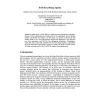595 search results - page 88 / 119 » Hippocratic Multi-Agent Systems |
ATAL
2003
Springer
14 years 28 days ago
2003
Springer
This paper introduces a methodology to help the programmer in the transition from a set of desired global properties expressed as an equation-based model (EBM) that a Multi-Agent ...
E4MAS
2006
Springer
13 years 11 months ago
2006
Springer
Indirect interactions have been shown to be of interest in MultiAgent Systems (MAS), in the simulation area as well as in real apns. The environment is also emerging as a first-ord...
ATAL
2008
Springer
13 years 9 months ago
2008
Springer
Abstract. Similarly to institutions in human societies, Electronic Institutions (EI) provide structured frameworks for Multi-Agent Systems (MAS) to regulate agents' interactio...
MKWI
2008
13 years 9 months ago
2008
: Multi-Agent systems follow a highly abstract programming paradigm. of this abstraction level, behaviours of the participants are not always clearly reproducible for humans. In th...
APIN
2006
13 years 7 months ago
2006
The Multi-Agent Distributed Goal Satisfaction (MADGS) system facilitates distributed mission planning and execution in complex dynamic environments with a focus on distributed goal...

